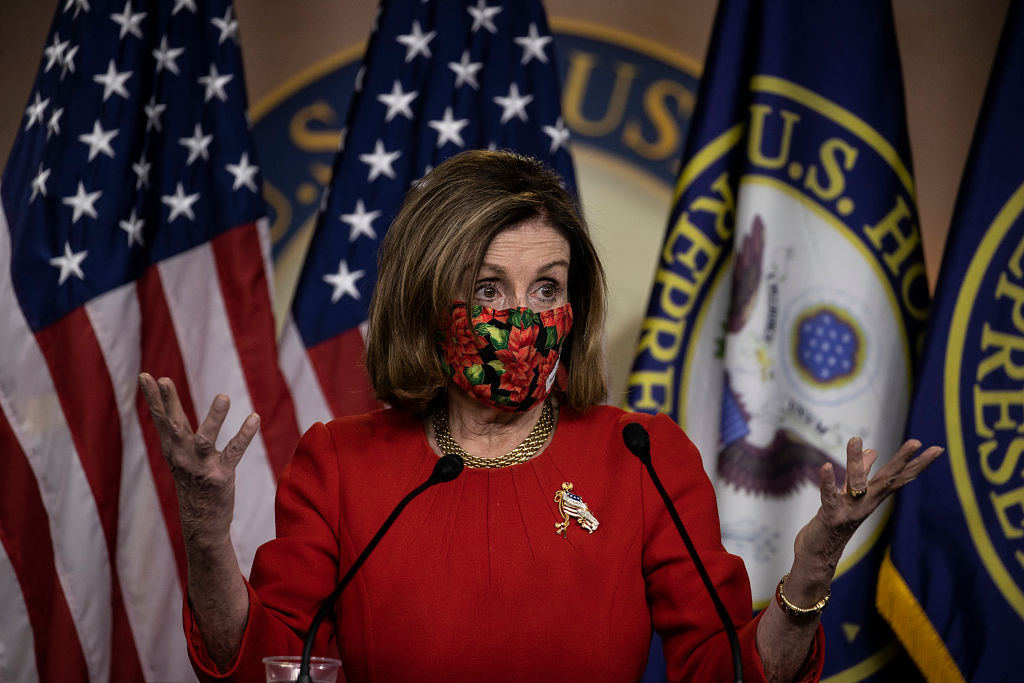$900 billion relief package extends moratorium on evictions, weekly unemployment benefits


A free daily email with the biggest news stories of the day – and the best features from TheWeek.com
You are now subscribed
Your newsletter sign-up was successful
After months of negotiations, congressional leaders finally announced on Sunday they reached an agreement on a $900 billion economic relief package, which includes $600 direct payments to Americans, aid for small businesses, and an extension of the moratorium on evictions that was set to expire at the end of the year.
The news comes as the country deals with a surge in coronavirus cases and overwhelmed hospitals, but also increased vaccine distribution to health care workers and nursing home residents.
According to summaries from Democratic and Republican congressional leaders, The Washington Post reports, the coronavirus relief bill includes $600 stimulus checks per person, including children, for people earning less than $75,000 in the 2019 tax year. The size of the check drops for those who earned between $75,000 and $99,000, and goes away completely for those who made more than $99,000.
The Week
Escape your echo chamber. Get the facts behind the news, plus analysis from multiple perspectives.

Sign up for The Week's Free Newsletters
From our morning news briefing to a weekly Good News Newsletter, get the best of The Week delivered directly to your inbox.
From our morning news briefing to a weekly Good News Newsletter, get the best of The Week delivered directly to your inbox.
The legislation extends supplemental unemployment benefits of up to $300 per week and a program for contract and gig workers. It also includes more than $284 billion to cover first and second forgivable Paycheck Protection Program loans and expands PPP eligibility to news organizations and nonprofits. Independent movie theaters and cultural institutions will also receive $15 billion, and a tax break for corporate meal expenses pushed by the White House was approved, despite objections from Democrats.
The package extends the moratorium on evictions until Jan. 31 and provides $25 billion in emergency assistance to renters, but the Post notes it's unclear at this time how the funding will be distributed. House Speaker Nancy Pelosi (D-Calif.) and Senate Minority Leader Chuck Schumer (D-N.Y.) said the bill sets aside billions of dollars "specifically for combating the disparities facing communities of color, and to support our heroic health-care workers and providers."
The agreement also includes $13 billion in increased food stamps and nutrition benefits, $16 billion for airline employee and contractor payroll support, $20 billion to purchase vaccines, and $82 billion for schools to replace and repair heating and air conditioning units in order to reduce the risk of spreading the coronavirus. It does not call for any new money for state and local governments or hazard pay for essential workers. Read more at The Washington Post.
A free daily email with the biggest news stories of the day – and the best features from TheWeek.com
Catherine Garcia has worked as a senior writer at The Week since 2014. Her writing and reporting have appeared in Entertainment Weekly, The New York Times, Wirecutter, NBC News and "The Book of Jezebel," among others. She's a graduate of the University of Redlands and the Columbia University Graduate School of Journalism.
-
 How the FCC’s ‘equal time’ rule works
How the FCC’s ‘equal time’ rule worksIn the Spotlight The law is at the heart of the Colbert-CBS conflict
-
 What is the endgame in the DHS shutdown?
What is the endgame in the DHS shutdown?Today’s Big Question Democrats want to rein in ICE’s immigration crackdown
-
 ‘Poor time management isn’t just an inconvenience’
‘Poor time management isn’t just an inconvenience’Instant Opinion Opinion, comment and editorials of the day
-
 Witkoff and Kushner tackle Ukraine, Iran in Geneva
Witkoff and Kushner tackle Ukraine, Iran in GenevaSpeed Read Steve Witkoff and Jared Kushner held negotiations aimed at securing a nuclear deal with Iran and an end to Russia’s war in Ukraine
-
 Pentagon spokesperson forced out as DHS’s resigns
Pentagon spokesperson forced out as DHS’s resignsSpeed Read Senior military adviser Col. David Butler was fired by Pete Hegseth and Homeland Security spokesperson Tricia McLaughlin is resigning
-
 Judge orders Washington slavery exhibit restored
Judge orders Washington slavery exhibit restoredSpeed Read The Trump administration took down displays about slavery at the President’s House Site in Philadelphia
-
 Hyatt chair joins growing list of Epstein files losers
Hyatt chair joins growing list of Epstein files losersSpeed Read Thomas Pritzker stepped down as executive chair of the Hyatt Hotels Corporation over his ties with Jeffrey Epstein and Ghislaine Maxwell
-
 Judge blocks Hegseth from punishing Kelly over video
Judge blocks Hegseth from punishing Kelly over videoSpeed Read Defense Secretary Pete Hegseth pushed for the senator to be demoted over a video in which he reminds military officials they should refuse illegal orders
-
 Trump’s EPA kills legal basis for federal climate policy
Trump’s EPA kills legal basis for federal climate policySpeed Read The government’s authority to regulate several planet-warming pollutants has been repealed
-
 House votes to end Trump’s Canada tariffs
House votes to end Trump’s Canada tariffsSpeed Read Six Republicans joined with Democrats to repeal the president’s tariffs
-
 Bondi, Democrats clash over Epstein in hearing
Bondi, Democrats clash over Epstein in hearingSpeed Read Attorney General Pam Bondi ignored survivors of convicted sex offender Jeffrey Epstein and demanded that Democrats apologize to Trump
